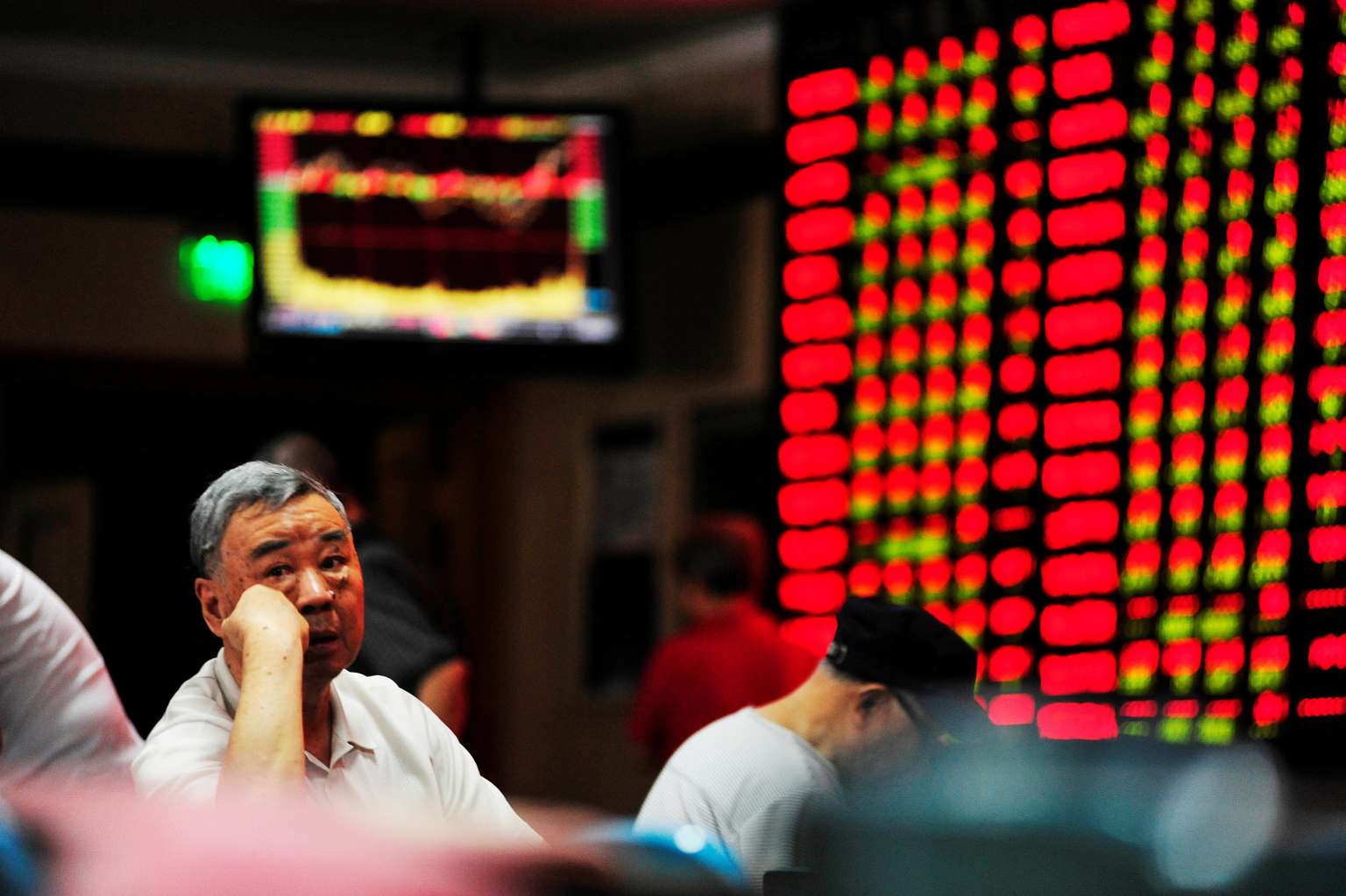China stock markets on track for worst year since 2011: poll of fund managers
Sign up now: Get ST's newsletters delivered to your inbox

An investor sits in front of an electronic board showing stock information at a brokerage house in Nanjing, China.
PHOTO: REUTERS
SHANGHAI (Bloomberg) - This year is seen going down as the worst since 2011 for China's stock investors as the memory of last summer's rout lingers and speculative buying switches to the housing market.
The Shanghai Composite Index will end the year at 3,075, according to the median forecast in a Bloomberg poll of 10 strategists and fund managers. That implies a 13 per cent drop over the 12-month period, the steepest in five years, and a gain of 2.9 per cent from Wednesday's close. Fading prospects for monetary easing, a slowing economy and the risk of higher U.S. borrowing costs spurring yuan weakness were among factors weighing on the nation's shares, the survey showed.
Turnover on the world's second-largest stock market has collapsed to a two-year low as China's army of investors, unnerved by 2015's plunge in equity values, charged into other assets. After a frenzied bet on commodities futures soured, they have set their sights on a bigger target - property. With new home prices now jumping the most in six years, analysts are scaling back projections for interest-rate cuts.
"The property market and the stock market are like a seesaw," said Li Lifeng, a strategist at Sinolink Securities Co. in Shanghai. "If the 'fever' in the property market doesn't cool down, funds will flow from equities into real estate." Small-cap technology stocks are the least preferred by analysts in the survey because of stretched valuations, while building companies are favored thanks to government efforts to boost infrastructure investment.
Technology shares were at the epicenter of last year's boom-to-bust amid surging demand from novice investors, with valuations on the ChiNext index reaching 130 times earnings at the peak. While the small-cap gauge is down 21 per cent this year in Shenzhen as margin traders cut leveraged bets, it still trades at 47 times profits, making the measure more expensive than the Nasdaq Composite Index.
"It will still probably take a long time for high-valuation technology companies to go back to normal," said Zhang Gang, a strategist at Central China Securities Co. in Shanghai.
Trading on China's stock exchanges has dwindled as share prices tread water. Five-day average turnover fell to 364 billion yuan, the lowest since November 2014 and down from more than 2 trillion yuan last year, while the Shanghai Composite Index closed on Wednesday at its average level for the past three months.
That's a sharp contrast with the housing market, which Ma Jun, chief economist of the People's Bank of China's research bureau, called a "bubble" in an interview this month, while others have warned of similarities with Japan's 1980s property boom that ended in a bust. New home prices in Shanghai jumped a record 4.4 percent in August for a year-on-year gain of 31 percent, while Beijing's climbed 24 percent from a year earlier.
The surge in home prices is complicating the task for policy makers seeking to shore up an economy growing at its slowest pace since 1990 without spurring excessive speculation. The PBOC has kept benchmark interest rates unchanged since October, while PBOC Deputy Governor Yi Gang said in a television interview earlier this month that the nation's short-term goal is to slow rising leverage. At the same time, the prospect of higher U.S. borrowing costs threatens to spur capital outflows as the dollar strengthens against the yuan.
"I am a bit more cautious" about the equity market now, said Central China Securities' Zhang. "The economy hasn't picked up and the U.S. may raise interest rates by the end of the year. It would require a change in the regulator's policy stance for stocks to break out of the doldrums." Bear Market Hong Kong stocks and mutual funds have also seen swelling inflows from the mainland as investors seek to hedge against a falling currency. Net buying of Hong Kong shares through a link with Shanghai totaled 58.7 billion yuan this month, compared with purchases of just 1.75 billion yuan in the other direction. The city's benchmark Hang Seng Index has climbed 7.8 percent this year, heading for its best performance since 2012 and trouncing the Shanghai Composite.
Mainland equities are "still in a bear market," said Yao Weiwei, a strategist at AXA SPDB Investment Managers and the most accurate forecaster in a previous Bloomberg poll. "Looking forward to the fourth quarter, it's pretty hard to see any definite positive news." The participants in the Bloomberg survey that provided the target for the Shanghai Composite were AXA SPDB Investment Managers, Central China Securities, Hwabao Securities Co., Jinkuang Investment Management, JK Life Insurance Co., KGI Securities Co., KraneShares, Shenwan Hongyuan Group Co., Xufunds Investment Management Co. and Yuanta Securities Co. HFT Investment Management Co., HSBC Jintrust Fund Management Co. and UBS Group AG also took part.


